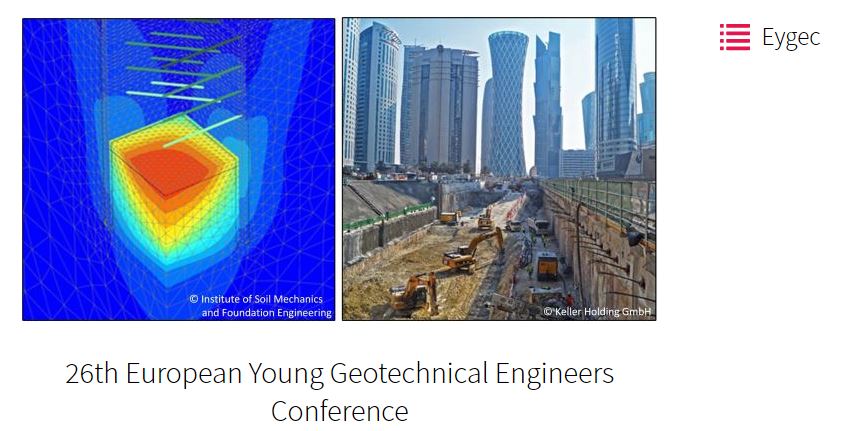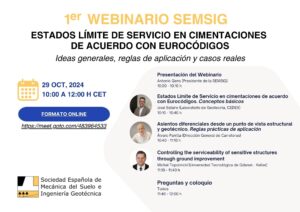26ª Conferencia Europea de Jóvenes Ingenieros Geotécnicos (EYGEC)
Graz (Austria), 11-14 de septiembre de 2018
ÍNDICE DE ARTÍCULOS:
1.- Finite Element Analyses for fracture assessment of rocks through an energetic approach: application of the SED criterion. Jon Justo, Jorge Castro y Césa Sagaseta
2.- Feasibility of using olive biomass bottom ash in the sub-bases of roads and rural paths. Manuel Cabrera, C. Rosales y Francisco Agrela.
1.- «Finite Element Analyses for fracture assessment of rocks through an energetic approach: application of the SED criterion.»
Autores: Jon Justo, Jorge Castro y Césa Sagaseta
Resumen:
This work presents an energetic continuum approach for the fracture assessment of rocks subjected to Mode I loading conditions and containing U-shaped notches with different radii, varying from 0.15 mm up to 15 mm. The notch fracture assessment is performed using the elastic stresses from conventional finite element analyses and an energetic approach based on the Strain Energy Density (SED) criterion.
The SED criterion states that brittle failure will occur when the average value of the strain energy density over a certain control volume reaches a critical value that only depends on the material. Under this premise, the experimentally obtained fracture loads are compared to those predicted by the SED criterion, checking its potential, capacity and limitations. To this end, the research is based on the results obtained from a systematic experimental programme comprising, among others, 300 fracture specimens tested in four-point bending conditions, 60 simple compression tests and 60 Brazilian tests.
The study requires a hybrid model that implements the numerical analysis of the stress field at the notch tip performed by a Finite Element Model under plane strain conditions and assuming a linear elastic behaviour of the rock, with a mathematical software that allows assessing the notch fracture through the SED criterion.
DESCARGAR ARTÍCULO (Solo para socios)
2.- «Feasibility of using olive biomass bottom ash in the sub-bases of roads and rural paths.»
Autores:Manuel Cabrera, C. Rosales y Francisco Agrela.
Resumen:
In road and rural-path construction, it is essential to minimize the use of additional materials, and eliminate earth moving as much as possible, for environmental and technical considerations. The soil treatment techniques contribute to the competitiveness and sustainability of road engineering. Soil stabilization is the process of alteration of geotechnical properties to satisfy engineering requirements. Extensive studies have been carried out regarding the treatment of expansive soils using various additives, such as lime, cement, fly ash, industrial waste products, potassium nitrate, calcium chloride and phosphoric acid. One of the biggest drawbacks of stabilization using lime or cement is their small particle size. Dust can be a problem, and its management is generally inadequate in populated areas
In recent years, interest in the recycling of industrial products and by-products has increased. One example of this is the use of biomass combustion in power plants. The management of significant amounts of waste (biomass bottom ash) from biomass power plants remains a problem. In recent studies, biomass bottom ash from wood combustion and agricultural olive residues was used as filler material in road embankments, as well as in the manufacture of cement-treated recycled materials. The goal of the present work was to evaluate the possibility of using BBA as a soil treatment to stabilize the sub-bases of roads and rural paths according to the technical specifications for road works imposed by Spanish regulation. This article discusses the experimental results of improvement of the properties of an expansive soil when it is treated with biomass bottom ash. Thus, the treatment or stabilization of expansive soils has been considered from the standpoint of civil engineering. These experiments have been based on tests to evaluate the use of these types of soil as building materials. To these ends, the following parameters were measured to physically and mechanically characterise the samples: granulometric composition, absorption, density, Modified Proctor test, CBR index, plasticity and the triaxial compression test, x-ray fluorescence spectrometry and scanning electron microscopy analysis with x-ray spectroscopy.




